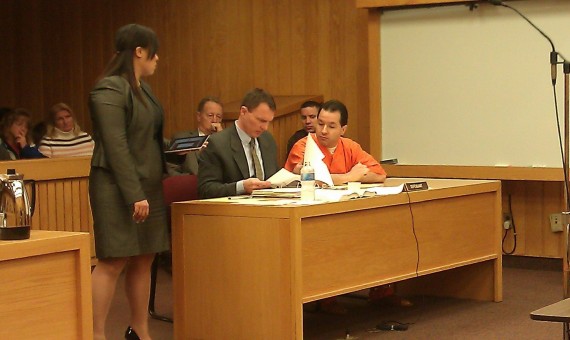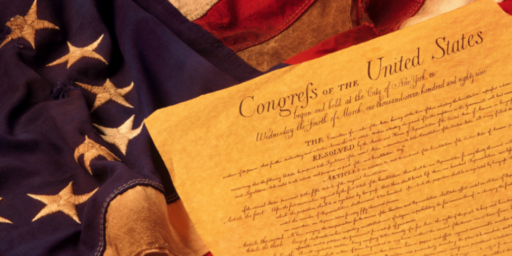Supreme Court Considers Case Where Civil Asset Forfeiture And The Sixth Amendment Collide
The Supreme Court is now considering a case that deals with the problem of overly broad civil asset forfeiture laws and a Defendant's right to counsel under the Sixth Amendment.
Yesterday, the Supreme Court heard oral argument in Luis v. United States, a case that deals with the issue of whether, and when, the government can seize assets prior to conviction when those assets are being used to pay for a Defendant’s criminal defense:
The case of Luis v. United States arose in 2012 when Sila Luis was indicted in Florida on charges of operating a complicated scheme that allegedly defrauded Medicare of upwards of $40 million. The federal prosecutor in her case sought and obtained a pre-trial order freezing her assets. What makes this order notable is that the federal government moved to freeze not only her “tainted” assets, meaning those assets that can be arguably traced back to the alleged underlying crime; but the federal government also moved to freeze Luis’ undisputedly legitimate assets, which amount to some $15 million that cannot be connected in any way to any alleged criminal activity.
Put differently, Luis v. United States raises significant questions about both the scope of the Sixth Amendment and the reach of federal asset forfeiture law. Luis—who has yet to be convicted of any crime connected to this matter—seeks to access her wholly legitimate assets in order to fund her criminal defense. She maintains that this is her right under the Sixth Amendment. The federal government seeks to stop her, arguing that the Sixth Amendment should pose no barrier to the prosecution’s tactics. According to the federal government, because all of Luis’ assets could be subject to forfeiture if she is ultimately convicted, federal prosecutors should not be stopped from freezing all of her “forfeitable” assets before she goes on trial.
This case raised obvious concerns in the area of civil forfeiture law, and area that has come under increasing scrutiny from a bipartisan group of organizations who have argued that the ability of law enforcement agencies to seize property from criminal defendants even before they have been convicted of an offense, and in some cases to keep that property even if the Defendant’s are acquitted at trial. It has always generally been the case that law enforcement has the authority to seize the assets of a suspected illegal enterprise such as a drug-running, gambling, or prostitution ring, as well as the proceeds of a crime. Thanks in no small part to the expansion of the War On Drugs, though, that authority has slowly but sure expanded to the point where law enforcement will routinely confiscate property that is arguably only tangentially connected to a crime, such as a car in which illegal drugs have been found and similar situations where property has only a minimal connection to criminal activity. In many cases, that authority includes the right to seize property even if it does not legally belong to anyone who is accused of being involved in criminal activity; all that is necessary is that the property in question have some connection to criminal activity. All of this raises serious due process concerns for both Defendants and the owners of property that is seized who are never even accused of a crime.
As Radley Balko notes, though, this case also implicates the right to counsel protected by the Sixth Amendment:
It isn’t difficult to see how this scenario presents a grave threat to the Sixth Amendment. (If you thought the public defender system was already overburdened, just wait!) As the defendant’s attorney pointed out in oral arguments yesterday, at the time the Sixth Amendment was written, indigent defendants had no right to a government-funded attorney. It’s difficult to imagine that the men who wrote and voted for the Bill of Rights would have both believed in the right to an attorney and in giving the government the power to make it impossible to pay for one.
Amy Howe, who previewed the argument in Luis for SCOTUSBlog on Monday, summarizes the oral argument:
During his half-hour before the Justices, [Luis’s attorney, Howard] Srebnick reiterated that – going as far back as the Founding – the Sixth Amendment has always recognized the right to spend your own money to hire a lawyer. This means, he asserted, that a defendant must be allowed to use the assets that she rightfully owns to pay for her defense.
But Srebnick had to grapple with the Court’s 1989 decision ruling that “tainted” assets could be frozen before trial to ensure that they would be available for forfeiture if the defendant is convicted. As he had in Luis’s briefs, Srebnick maintained that the earlier case was different because no one has a right to drug money, allowing the government to freeze it before trial. By contrast, he told the Court, in this case Luis is the exclusive owner of her “untainted” assets. If she is eventually convicted, he conceded, then the U.S. government may seek money, but it is hers until then.
Justices of all ideological stripes appeared unconvinced. Justice Elena Kagan told Srebnick that there is a “powerful intuition” to his argument, but “it seems that the distinction you’re making is one the Court explicitly rejected in” its 1989 ruling. Your case, she continued, “doesn’t seem to present any different circumstances.” Roberts was also skeptical, telling Srebnick that, “if you can freeze tainted assets without running afoul of the Sixth Amendment, I don’t understand why you can’t freeze untainted assets.”
Justice Samuel Alito seemed to agree. He asserted that, “as a matter of economics and common sense,” “money is fungible.” He described a hypothetical in which twin brothers rob a bank and steal $10,000, which they divide between the two of them. They also each receive $5,000 as a birthday present from a rich uncle. The first twin spends all of his money from the robbery but saves the birthday money, while the second one spends all of his birthday money but saves the money from the robbery. Under Luis’s position, Alito emphasized, the first brother could use his money to hire a lawyer, but the second one couldn’t. “What sense does that make?” Alito asked. Justice Anthony Kennedy chimed in, telling Srebnick: “The law that you want this Court to say is ‘spend the bank robbery money first.'”
Justice Ruth Bader Ginsburg also appeared sympathetic to the government, telling Srebnick that Congress had singled out some crimes – including the health care fraud alleged in this case — for special treatment, and it declined for such crimes to draw a line between tainted and untainted assets. “They seemed to want to come down very hard on these crimes,” she suggested.
The Justices also expressed concerns about how far Luis’s proposed rule would reach. Justice Sonia Sotomayor told Srebnick that the “logic of your argument would suggest that you can’t freeze untainted assets for anything, because the government has no property interest.” Srebnick tried to reassure her that he wasn’t asking the Court to go that far, but she countered that “once we announce a rule, we have to carry it to its logical conclusion.” Sotomayor (herself a former federal district judge) also expressed concern about the practicalities of Luis’s proposed rule, asking Srebnick how the district court can “ensure that” Luis “doesn’t use every penny” for her defense, leaving nothing for the government if she is convicted.
(…)
Deputy Solicitor General Michael Dreeben, arguing on behalf of the United States, emphasized that the same principle animating the Court’s decision allowing restraints on tainted assets before trial applies equally to untainted ones: if the government can get the money at the end of the day, he told the Court, it needs to be sure that the money will be available. The statute on which the government relied to freeze Luis’s assets, he added, “negates the premise that there is a clean line between tainted and untainted assets.”
But if the Justices were worried about the limits of Luis’s proposed rule, they had similar concerns about how broadly the government’s rule would sweep. Kennedy asked Dreeben to explain what limits the law puts on the government’s ability to freeze assets. If the government wins, he predicted, states could freeze assets for any number of reasons, prevent the private bar from representing them unless they did so on a contingent basis. Kennedy would return to this point again later on, telling Dreeben that the consequence of his position was that any state can freeze assets pending trials for all kinds of offenses, from assault and battery to date rape, even if – as a result – most people cannot afford to hire lawyers. Roberts echoed this thought, telling Dreeben that, on the government’s reading, the asset freezes could “apply to every crime on the books.” Sotomayor weighed in as well, predicting that, if the Court were to rule for the government, in three-and-a-half years Congress will change similar federal laws to allow the government to freeze “untainted” assets before trial in all kinds of crimes, preventing even more defendants from retaining their preferred lawyers.
Based on the oral argument summaries, it seems unlikely that the Justices are going to adopt the broad interpretation that Luis’s lawyer is looking for here. Based on Howe’s reporting, for example, it appears that even Justices who might be sympathetic to the Sixth Amendment issues that are raised her are reluctant to go that far because of what it would mean for civil forfeiture law in general. At one point yesterday, for example, Justice Scalia asked Luis’s attorney whether his rule would mean that a Defendant who is a devout Muslim could be able to claim that certain assets that the government is seeking to seize were intended to be used to finance his pilgrimage to Mecca and that seizing them would therefore violate his right to freely exercise his religion. While Scalia’s hypothetical may seem like an unlikely one, it is an indication that the Justices are concerned about a rule that would say that forfeiture that would otherwise be permitted under existing law can be overriden simply by a Defendant’s assertion that the assets in question are intended to be used to some purpose protected under the Constitution. How this case turns out could depend on whether or not they are able to find a middle ground that allows Defendants such as Luis to use funds that seem demonstrably unconnected to criminal activity to defend themselves from charges that they are, after all, presumed innocent of until proven guilty beyond a reasonable doubt.
Ultimately, the solution to the problem that this case, though, lies in the legislature rather than the Courts. For decades now, and indeed going well back in common law, the courts have recognized the authority of government to seize assets connected to or used in connection with a crime and, in principle, there is nothing wrong with that idea. Nor, in principle, is there a problem with the idea that the Courts should have the authority to freeze those assets pending the resolution of the charges against the Defendant. The problems with civil assets forfeiture, though, have come largely due to the fact that legislatures at the state level, as well as Congress itself, have greatly expanded the authority of law enforcement to seize and freeze assets and, as noted, even sell them with proceeds going to the government in cases where the Defendant has been acquitted of the underlying crime. Fortunately, there does seem to be some movement on this issue, as The Daily Signal, the blog of the Heritage Foundation, noted back in June:
This briefing comes at the heels of hearings in both the Senate and the House of Representatives. Sen. Rand Paul, R-Ky., and Rep. Tim Walberg, R-Mich., have introduced a comprehensive civil forfeiture reform measure, the Fifth Amendment Integrity Restoration Act (FAIR Act). Sen. Charles Grassley, R-Iowa, chairman of the Senate Judiciary Committee, has made forfeiture reform one of his top priorities. His own reform proposal is expected soon.
While the federal level is the most significant front in the battle for civil asset forfeiture reform, advocacy cannot end there. Even if federal laws were changed tomorrow, abusive forfeitures could still take place under state civil forfeiture laws. Fortunately, state lawmakers have taken this seriously. Montana, Minnesota, New Mexico and Washington, D.C., have enacted sweeping reforms this year. Pending legislation in California, Michigan andPennsylvania also looks promising.
Sarah Stillman, the moderator of last week’s bipartisan panel, joked that when her original piece on civil asset forfeiture appeared in The New Yorker, no one would entertain the seemingly dull topic in conversation. Now, public support is rallying behind the reform movement, aided by popular exposés such as John Oliver’s on “Last Week Tonight.”
The interesting thing about the civil asset forfeiture reform movement is that it is bringing together groups that you ordinarily wouldn’t expect to see working together, including not just the Heritage Foundation, but also the American Civil Liberties Union and FreedomWorks. Additionally, as noted, legislators on both sides of the aisle in Congress seem very interested in fixing this problem. If they’re successful then, hopefully, cases like Mr. Luis’s won’t be an issue in the future or at least there will be some mechanism to allow future Defendants in his position to be able to adequately defend themselves as the Sixth Amendment intends.






So having chipped away at our Fourth, Fifth, Seventh and Eight Amendment rights, the court wants to finish off our Sixth Amendment rights. Lovely.
The gripping hand here is that the 1989 ruling was wrong. The government’s “right” to seize your money should not take priority over your right to defend yourself in a court of law. Freezing those assets is basically pronouncing someone guilty and declaring that they can’t get them back until they prove their innocence (which, conveniently enough, you’ve hamstrung their ability to do). Scalia’s analogy is insane. They’re not asking to preserve these assets for a trip to Mecca. They’re asking to use these assets to acquire a lawyer and defend themselves from a government that has effectively unlimited assets. it’s circular logic. “We can’t let you have that money to defend yourself from a ruinous prosecution because we need that money once we’ve finished prosecuting you.”
The 6th Amendment argument seems weak, given that I don’t understand how civil forfeiture absent conviction survives scrutiny under the 5th Amendment’s prohibition against being “deprived of life, liberty, or property, without due process of law; nor shall private property be taken for public use, without just compensation.”
Simple accusation by police surely isn’t “due process of law.”
And I bet if we go back and look at how this asset forfeiture got started, there were a heck of a lot of pundits who claimed “oh, but you don’t have to worry about this unless you’re a criminal.”
And I bet if we go back and look at how this asset forfeiture got started, there were a heck of a lot of pundits who claimed “oh, but you don’t have to worry about this unless you’re a criminal.”
@James Joyner:
That was part of the argument that the defendants tried to raise in last year’s Kaley v. US. The Court decided 6-3 that being indicted was enough due process of law. Which is shocking given how much of a rubber stamp grand juries are. Given that the Court’s history with asset forfeiture cases, in which they almost always allow it, the sixth amendment is all we’ve got. It’s too late to fall back on the fifth; that amendment has already been burned by numerous precedents.
Radley Balko likes to note that basically none of the justices have practical experience with the criminal justice system. They all come from white shoe law firms or academia or politics. It shows. It what enables them to issue decisions like Kaley where they wax rhapsodic about how wonderful the grand jury system is.
Honestly, I think the only way this is going to stop is for the legislature to act. It’s clear that the Court is too fixated on the majesty and theory of the law to actually do anything. The Court are only one of the three branches that are supposed to protect our liberty. When they won’t act, the legislature must.
Also to be considered are creditors, investors, partners, employees,family, and others. When the government seizes property, often these people are left out in the cold, through no fault of their own
Consider also, the IRS which seems to have unlimited powers to seize property, lock people up, and close businesses; without a trial.
@James Joyner: the issue is can you use stolen money to fund your defense . plus it prevents the defended from transferring legitimate money , that can be taken for punitive purposes as punishment ..money can be seen as community property and it was co- mingled with clean money then it is all dirty.
@Hal_10000: you can not use ill gotten gains to defend yourself . when the government can reasonably prove you obtained it illegally ..’ CRIME CAN NOT PAY “
@grumpy realist: That part comes under the Ed Meese rule: “we know that people are criminals because they have been accused of crimes; the justice system does not accuse innocent people.”
@Tyrell: Well these so-called “innocent people” shouldn’t have loaned money to, invested money with, gone into business with, worked for, married or been born into families with these criminals then, now should they? When are you liberals going to stop being weak on crime?
@peter:
Sorry, you’ve got it backward. Sure, crime can not pay. But it is the obligation of the government to first prove they are ill-gotten gains (that’s what the Fifth Amendment is for). It can not simply declare they are ill-gotten, take them away and then defy you, sans attorney, to prove your innocence and get them back.